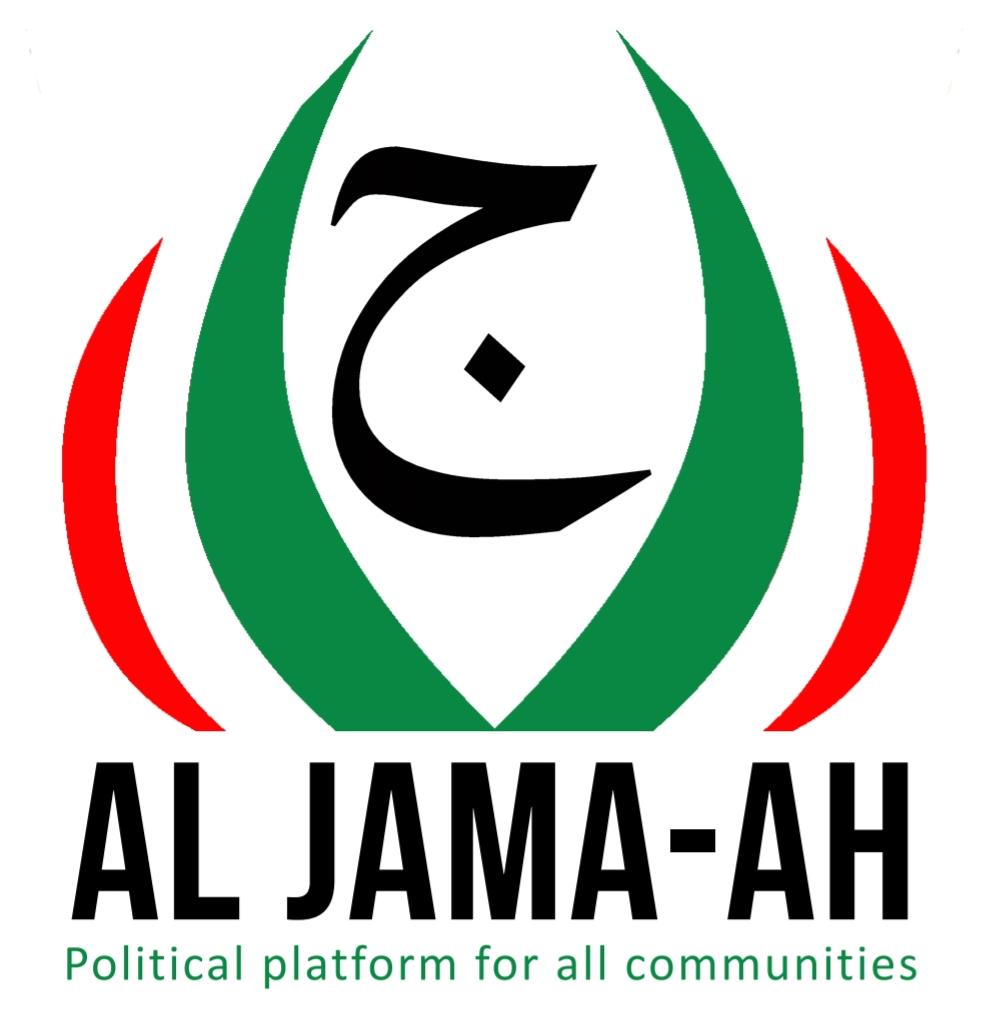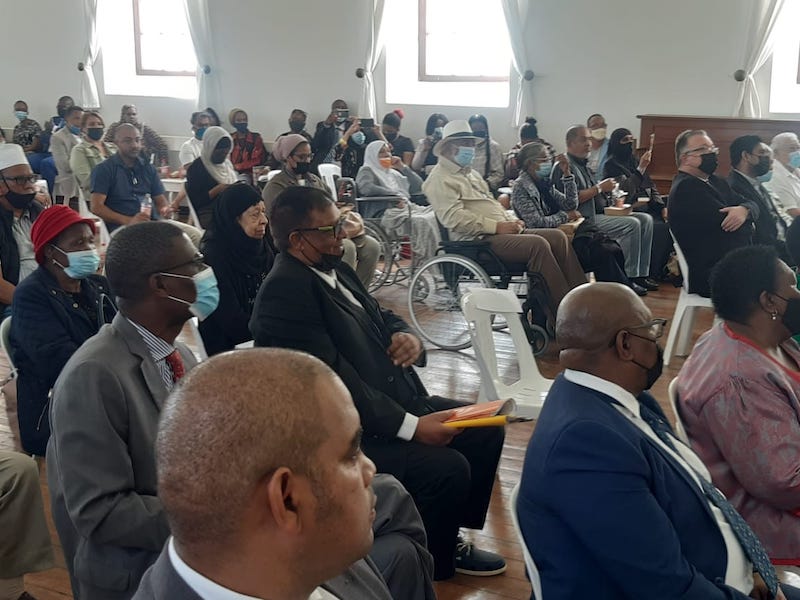
The long-awaited oversight visit by the Deputy President David Mabuza initiated by Al Jama-ah’s leader and Member of Parliament Hon Ganief Hendricks took place on Tuesday 22 March 2022.
The delays in the process of restitution caused much distress amongst the claimants and Hendricks intervened by engaging with the Honourable Deputy President, in his capacity as the Chairperson of the Inter-Ministerial Committee (IMC) on Land Reform and Agriculture, to undertake an oversight visit to District Six. In response to this urgent quest, the reply was positive, an affirmation of the government’s commitment to redress the past’s injustices by ensuring that the land be restored to its rightful owners.
David Mabuza in his capacity as the Chairperson of the Land Reform Inter-Ministerial Committee was invited by Hendricks for an oversight visit to District Six to investigate the exorbitant costs of building the units and delays in completion of the development.
Mabuza praised Hendricks for calling the long awaited oversight visit. Addressing the audience who included several claimants, Hendricks described the 20-years wait to return to District Six as torture, worse than the forced removals and demolishing of peoples’ homes. He called for reparations based on inter-generational wealth which the future generations of claimants could benefit from. “There were 60 000 residents that were forcefully removed out of District Six. The reparations given to them is only 42 hectares of land. The rest of the land was stolen by the Technikon,” says Hendricks.
View full gallery here
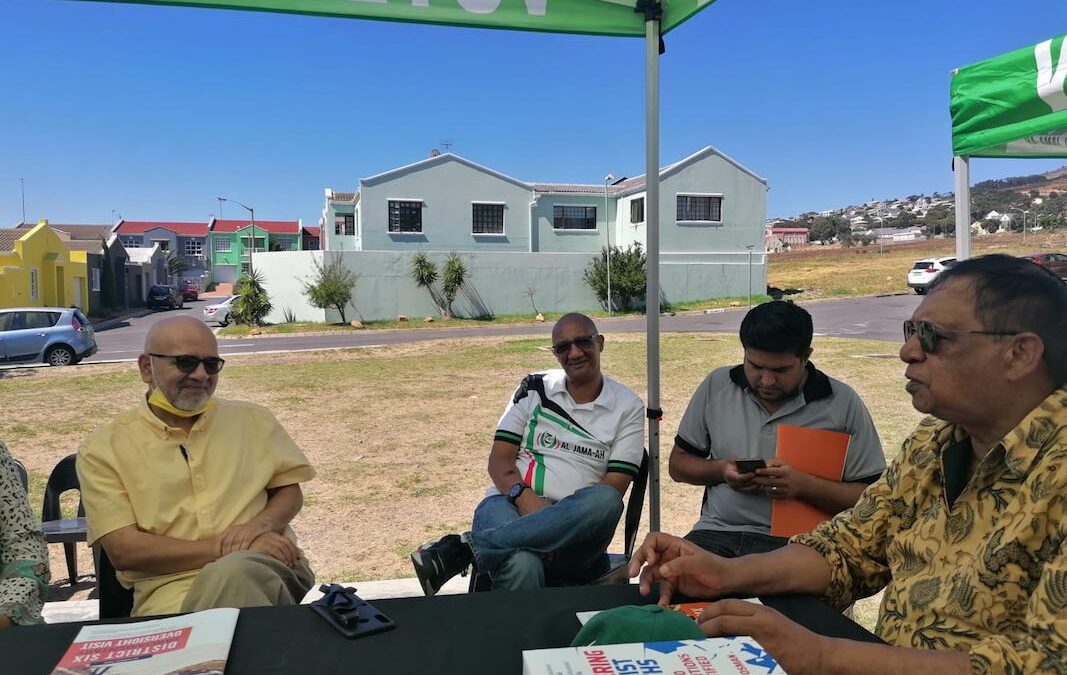
Aljama-ah hosted a book launch on Human Rights Day to reflect on District Six struggles, on Monday,21st March 2022, in Zonnebloem, Cape Town. The author of the book is Prof.Haron and the title of the book is District Six Parliamentary Oversight Visit.
The revolutionary song, Tala’ al-Badru ‘Alayna which was sang by the people of Madina to Prophet Muhammad (PBUH) when he entered the city, should be sang to the last returnees of District Six,says Al Jama-ah leader and Member of Parliament Hon Ganief Hendricks.
Hendricks was speaking in District Six on Human Rights Day/Sharpeville Day 21 March 2022 at the party’s launch of the book District Six Parliamentary Oversight Visit March 2022 on the eve of South Africa’s Deputy President David Mabuza’s oversight visit to District Six from where 60 000 people were forcibly removed from under the Group Areas Act during apartheid during the 1960s-1970s.
“I remember singing this song along with non-Muslim friends in District Six. Therefore, I think it would be symbolic when the last claimants of District Six move back, for the current residents to sing this song and beat the drums as they walk back to their homes,” Hendricks explains.
The melodious rendition of the song was sung by the party’s Western Cape Legislature representative, MPL Maulana Galil Brinkhuis who hails from Strand.
View full gallery here
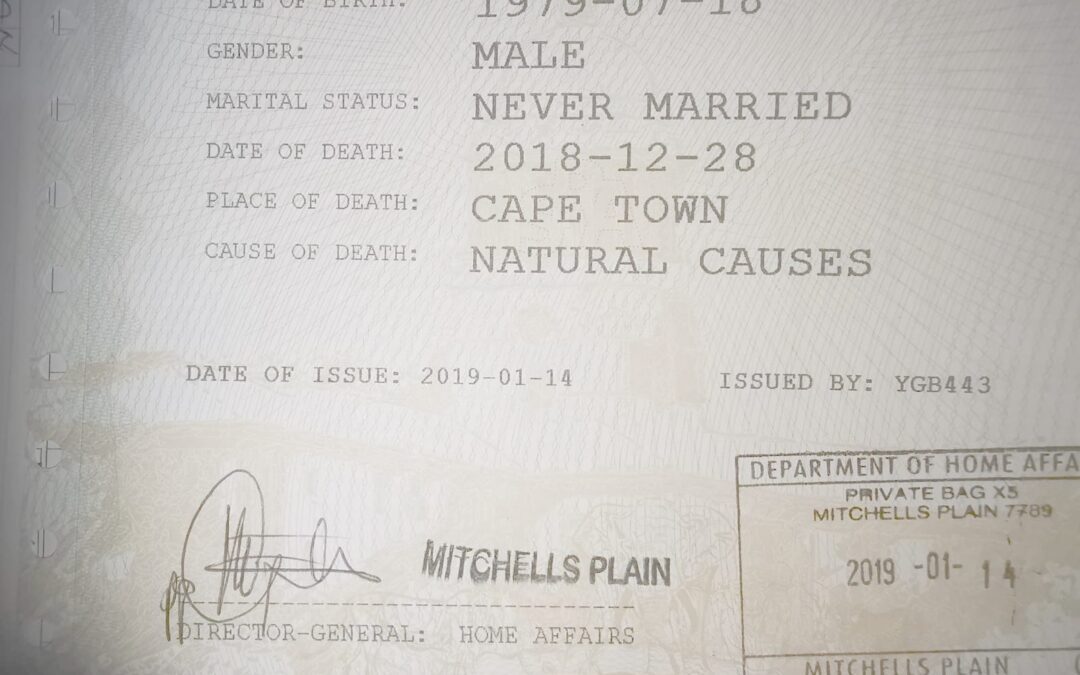
Image: The death certificate of a Muslim deceased person states “Never married” despite the deceased person being married for many years according to Islamic rights.
Al Jama-ah, which voices its confidence in the South African democratic system despite its glaring shortcomings, is proudly committed to the Muslim faith. Armed with this, Al Jama-ah is further motivated by a comprehensive philosophy that is deeply embedded in Islam’s primary sources from which the party gains its inspiration. As a Muslim party, Al Jama-ah adopted a positive approach in engaging with its society’s socio-political, economic, and cultural affairs.
As part of Al Jama-ah’s mission, it committed itself to bring about constructive change and meaningful transformation; it pursued this path with the fervent hope that these would not only benefit the Muslim community that it represents but that it would profit others too; hence the adage: a political platform for all communities.
Over the years, Al Jama-ah has been making inputs via various platforms and it successfully managed to secure a seat in Parliament; being in this position, Al Jama-ah’s president, Hon. Ganief Hendricks, with the support of a team of councillors charted out ways and means to address Muslim matters. Since it remained passionate to serve the Muslim community (and others), it channelled some of its energies and resources to address sensitive concerns such as the recognition of Muslim marriages.
Even though much effort has been made since the time the late Advocate Abdullah Omar was appointed as our democratic country’s first Minister of Justice in 1994, the Muslim community has been unsuccessful to have their marriages recognized or a basic Nikah certificate issued by the state. This may be attributed to diverse factors and one of these was the impasse that has emerged because of unnecessary disagreements among the Muslim stakeholders.
The Muslim Judicial Council and the Jaamiats want codification and regulation so that they can be firmly in control of Muslim affairs in South Africa. There is an overwhelming rejection of this position and that is why the Cabinet shelved the old Muslim Marriages Bill. Al Jama-ah supports the position that there should rather be a focus on official registration after a Nikah and that we must not allow law makers to tell Muslims how to practice their Marriage laws. There are over 1000 marital dispute structures in South Africa and a focus should be to take them to the next level so that their determinations have legal muster. Muslim NGO’s like Gift of the Givers, Islamic Relief should set up a special fund to achieve this. The strong feminist lobby has successfully delayed progress while we acknowledge the right to contest patriarchy tendencies in many of these alternative dispute resolution structures. They should rather be part of these structures. This will help reduce gender-based violence by Muslim men against Muslim women. The silver bullet that may appease them is an aggressive Khutabah campaign by the Ulama that after a Talaq or a Fasaagh a very generous “gift” must be given to former wives. This will help soften the blow and match the proprietary rights that women are entitled to in terms of the laws of the land.
In the light of the Muslim community’s failure to realize this goal and the disappointment expressed by Muslim women for not being given the necessary protection by the South African legal system, Al Jama-ah took on this task; it did so to get the Muslim community out of this quagmire by using its parliamentary position to devise a Private Members Bill (PMB) on Muslim marriages and having it pushed through the parliamentary system.
Al Jama-ah’s legal team met with the Muslim Judicial Council’s Muslim Personal Law’s technical committee; this was headed by Dr Munier Abduraouf and Sheikh Igsaan Taliep. Along with them, they worked out a pathway out of the impasse as regards the way forward. Thereafter, Al Jama-ah’s legal team produced a draft of the PMB that had been shared with Muslim organizations for inputs and comments. The team adopted a minimalist approach asking for the judgement of Supreme Court of Appeal (SCA 18 December 2020) to be unpacked as part of an interim arrangement until the One Statute Act comes into play in 2024 (or perhaps later).
As soon as it is finalized, the PMB will be placed on Parliament’s agenda. While it is hoped that it will not face any needless hurdles, during February 2021, Al Jama-ah’s president, Hon. Ganief Hendricks asked Hon. Dr. Pakishe Aaron Motsoaledi, the Minister of Home Affairs, relevant questions related to the issue.
One of the two that he posed was: what prevented our government from affording legal recognition to Muslim marriages by using the same procedure that provides for the recognition of African customary marriages through the registration process in the department while permitting for the nikah certificate to be issued by an officiating Imam in the same way as the lobola certificate is issued by an African customary official such as an Induna?
Unfortunately, the Hon. Minister, who could have been sensitive to the issues at hand, simplistically replied (No. 1744) that the government had no powers to have Muslim marriages legalised; he conceitedly opined that this could not be done through the Recognition of Customary Marriages Act; an Act that was regulated by the Recognition of Customary Marriages Act, 1998. Well, the Minister’s response was in defiance of the later SCA judgement.
Now since this route was not considered nor tested, Al Jama-ah put forward the PMB as a tangible and practical alternative. Since it is using the Parliament as its vehicle, it has been lobbying support from the ruling party as well as other parties. Getting support from all of them would boost Al Jama-ah’s chances in having PMB approved and bringing relief to thousands of Muslim women who have been short-changed by our democratic system.
The MJC and the Jaamiats must show leadership and support this first step.
Visit Al Jama-ah’s website:https://www.aljama.co.za/recognition-of-marriage-bill/
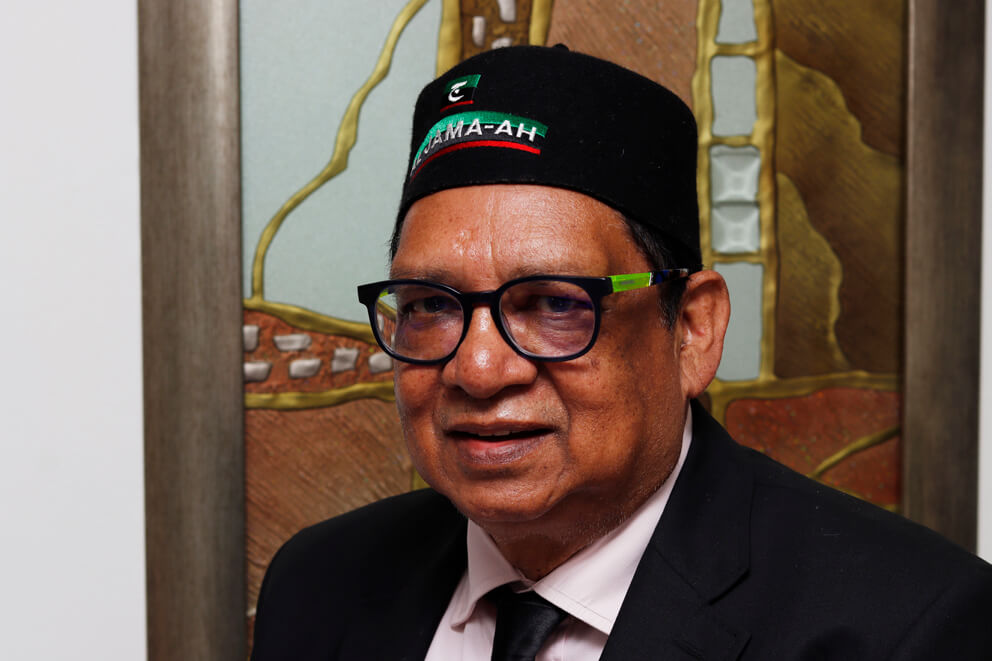
Caption: Party leader | Ganief Hendricks
Hon. Mr. Ganief Hendricks, Al Jama-ah’s leader, spoke to the SABC, SA’s public broadcaster, during the time it conducted a series of election manifestos with political parties.
-
Introduction
Al Jama-ah, unlike other South African Muslim organizations, is a bona fide political party that contests local and national elections. But like these Muslim organizations, it subscribes to principles that are rooted in a divine legal system known as the Shari’ah. From a Muslim theological and juristic perspective, it is an eternal sacred system that is unquestionably unchangeable, and undisputable.
-
Shari’ah: An Unalterable Divine System
Shari’ah, it should be stated, is ‘an ideal path; that leads an individual to submit and worship God who is One and life’s ultimate source. For this reason, a Muslim (that is, the person who submits to God) perpetually advocates the concept of Tawhid (that is, God’s Oneness). Whenever he/she performs his/her daily thikr, each one reminds oneself of God; so, whatever he/she does, wherever he/she goes, and whenever he/she confronts challenges, God remains uppermost in that person’s mind.
The scholarly consensus is that Shari’ah’s origins are derived from its twin primary sources, namely the Qur’an (God’s revelation) and the Sunnah (Prophet’s practices/statements); while both these foundational structures are considered sacred, they have been open to various readings and interpretations since the prophetic period (circa 610-632); this continued to this day. On top of that, Shari’ah is regarded by all Muslims as an all-encompassing scheme; one that covers all human activities.
Now since all Muslims consider this a fixed immutable system, majority and minority Muslim communities have faithfully observed its principles in their private and public lives over the ages. Though the scholars (also referred to as ‘ulama that include theologians, jurists, and others) seldom questioned the Shari’ah – being their accepted and undeniable divine system – they passionately engaged with the foundational structures; this, however, depended upon their socio-political, economic, and cultural circumstances.
-
Fiqh: A Juristic Apparatus for Interpretation
In these situations, the ‘ulama made use of Fiqh (literally means: understanding); it consists of a set of jurisprudential tools that may be described as a particular juristic method used to reach human understanding of the divine system. Worded differently, Fiqh refers to the mujtahid’s – someone who applies his/her rational faculties to arrive at a juristic assessment – knowledge about past & present legal rulings; ones that were extracted from various (related) legal sources.
It is a system that thus aids the mujtihad (that is, the jurist who possess the skills and knowledge) and the Muslim community (that he/she serves) to gain a deep insight and perception of the socio-political scenario they are confronted with. Fiqh may be comprehended as a legal juristic apparatus within Shari’ah; one that helps to expand and develop it. This, moreover, takes place through an ijtihadi approach; one that employs rational interpretative principles to find ways of adjusting and applying them to the socio-political environment (such as South Africa).
The ‘ulama either invent/construct or find fatwas (that is, legal judgements/opinions) that may be applicable in the surroundings in which they find themselves. As the ‘ulama’s opinions increased and as differences appeared over time, schools of jurisprudence were established. During the earlier centuries and in the post-prophetic period, the Shafi’ite, Hanafite and other schools emerged.
The mentioned two became dominant in Southern Africa. Though scholars, who adhere to one of these schools, have invariably differed from their counterparts on juristic matters (such as an individual participating in secular system socially and politically as is the case within the South African dispensation), they generally agreed that Shari’ah remained unchallengeable.
At this point, it should be repeated that Fiqh, unlike Shari’ah, is fallible and changeable. One may further state that Fiqh is a flexible legal devise that provides an insight into the observance of rituals, application of morals, adherence to social legislation, and adaptation to political conditions within and outside the house of Islam. Since Fiqh assists in opening pathways in life in specific situations or in extraordinary circumstances without the individual’s faith being diminished or abandoned; nay, it, in fact, creates chances to affirm and strengthen one’s faith in God and in the community that the person serves.
-
Al Jama-ah on Shari’ah
Unfortunately, it seems that the SABC journalist, who posted online the summary of Hon Hendrick’s interview, gave an erroneous understanding of Al Jama-ah’s position vis-à-vis the Shari’ah. He and the Party’s members fully identify with this sacred system upholding it as a watertight, reliable system in their private and public lives. As far as records demonstrate, the Party never offered any other view that contradicts this stance.
Hon Hendricks, however, stressed that it is the Fiqh dimension that has been deliberately confused – probably out of ignorance – with the Shari’ah; as explained above, there are technical differences that do exist. Now, while Al Jama-ah and its members firmly subscribe and comply with Shari’ah, it is the set of Fiqh rulings within Shari’ah in general and the South African context, in particular, that guide the Party as well as all the Muslims who are South African citizens or residents. These they obtain from the recognized ‘ulama and bodies that have taken charge of these aspects of the community.
Being part of the Muslim community in South Africa, the Party, which publicly adheres to its Islamic ethos and principles without any state interference, accepts the country’s Constitution. It does so, even though it might have different understandings of some of the clauses that permit certain practices that are out of sync with Islam’s teachings. In fact, as a Muslim-oriented party, it argues that Islam’s teachings permit Muslims to show respect to the secular legal system and it encourage them to obey it despite clauses that may appear problematic when applied.
Anyhow it is important to state that Mr. Hendricks is aware of the challenges that the Party faces within the South African secular context; he knows that even though many Muslims do not support the Party and that it competes with others for Muslim votes, it is confident that this will change with the current election. During the past few years when it went to the polls, it was interesting that many of its supporters came from outside the Muslim community and this illustrates that others have confidence in the Party’s agenda.
In closing the issue, the Party turns to a debatable matter (that probably falls under Fiqh); it, along with a few other parties, stated that if it gets into power in Greater Cape Town, it intends to implement the contentious ‘expropriation of land without compensation in the post-local government elections. Now it is beyond question that certain members of the South African voting community would not want to see this happen, and they would most likely use their vote to counter the Party! Important is that the Party remains resilient and that it faithfully finds ways of wooing voters to see its bigger plans for our communities.
Aluta continua!
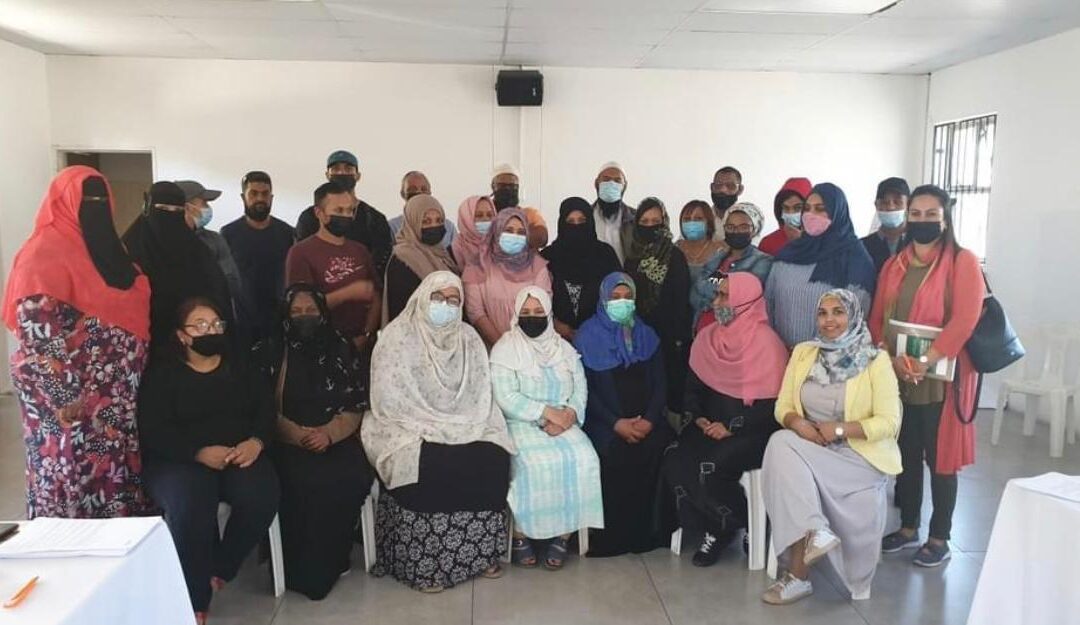
Hon. Ganief Hendricks leader of AL JAMA-AH in the South African National Parliament and a full member of Parliament’s Portfolio Committee on Small Business Development has announced that his Party will launch an “Incubator” to assist and mentor small businesses to start a sustainable and profitable business.
Al Jama-ah hosted a small business workshop on the 6th and 7th October 2021, whereby 25 small business entrepreneurs received training. The purpose of this event was to provide training and assistance to residents from the Mitchell’s Plain area, in their small business ventures.
It was a start-up training course with SEDA for our youth in Mitchell’s Plain. The workshop took place at MASJIEDUL JUMMUAH, shepherd Way, Westridge Mitchell Plain. The 25 entrepreneurs were spoilt to lunch, tea and received certificates upon completion of the course.
THE FOLLOWING TOPICS WERE COVERED DURING THE 2 DAY WORKSHOP:
- Start up of a Business | Financial Planning
- Marketing Strategy | idea Generation
The programme was hosted by Moulana Ely and Imam Nolan. Imam Nolan is the Imam at the Jumu’ah mosque in Westridge, Mitchells Plain.
He said: “I’m fully involved with the initiative and I encourage small business ventures in the disadvantaged communities.”
Mingha Field, the coordinator of the workshop said: “The small business programme was the initiative which was announced by President Cyril Ramaphosa during the previous state of the nation address. Al jama-ah president Hon. Ganief Hendricks is part of the government initiative to empower the youth with economic development through business.”
Hon. Hendricks stated: “I’m fully behind the concept of empowering the youth and women. We have already made our selections from hundreds of applicants. The government has made training and grants available as capital for the small business applicants.”
Hon. Ganief Hendricks concluded by saying “It is the youth who can save the economy and drive South Africa’s economy.”
TO FIND OUT MORE: Contact your Ward councillor for more information
Achmat Hendricks | 071 065 9663
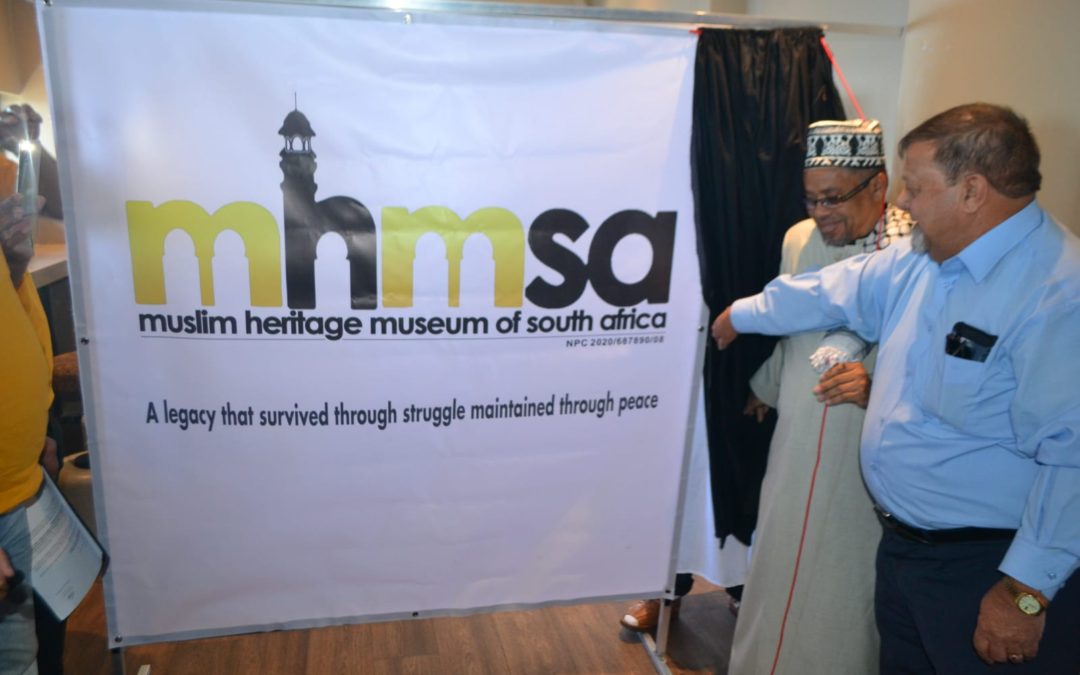
HERITAGE DAY – Al Jama-ah hosted and named South Africa’s first Virtual Muslim museum on Table Mountain on National Heritage Day, 24 September 2020.
One of the museum’s founding directors is Yasien Mohamed, a member of the Pan-Africanist Congress of Azania (PAC) and a veteran of its military wing, Apla (Azanian Peoples’ Liberation Army). Mohamed played a major role in converting Robben Island into a museum, depicting the history of political prisoners held on this once notorious island.
The unveiling of the virtual museum caused so much enthusiasm and excitement amongst the Community. The birth of the Virtual Muslim Heritage Museum captured the attention of the Voice of the Cape, Cape Town TV, SABC, ITV, and Channel Islam International as well as Radio Islam. People started telling their stories at the event, which was documented by brother Faizel Sayed of Deen TV. Branded T-shirts are up for grabs and interested participants can enter the competition.
The mission of the museum is to capture the 350 years of Muslim history in South Africa. It will also record Muslim history as it happens today, with the focus on Africa. The museum’s objective is the recording and preserving Muslim history in South Africa,
The first person to record a narrative was Valerie Truter, the sister of Christopher Truter who was shot dead through the head by apartheid security police in 1976, told the museum’s first story which will be documented in the museum’s archives. Valerie received a framed certificate from Al Jama-ah’s Councillor Faried Achmat, honoring her bravery.
Al Jama-ah’s member of the Western Cape legislature, Hon. Moulana Galil Brinkhuis who hosted the launch described it as a historic occasion. “Muslims share a very rich history and vibrant cultures and traditions in the country which we must preserve,” Brinkhuis said. The museum will start archiving historical documents and stories immediately. A local mosque in Cape Town in Grassy Park has offered one of its floors as an archive platform.
Al Jama-ah’s leader and member of parliament Hon. Ganief Hendricks confirmed that the party has registered the museum as a non-profit company (NPC). The NPC’s secretary is Moulana Tawfeeq Ely who represented Al Jama-ah at the “Youth in Parliament” on Youth Day.
“Muslims in South Africa must preserve their history, as a nation without a memory, has no culture. The Muslim museum will be a great legacy to leave behind for the next generations,” Hendricks said. Table Mountain symbolizes the struggle and the mountain is the pride of the people.
During the Dutch occupation, Islam and Congregational prayers were prohibited at the Cape. The first known Congregational prayers in South Africa was held on Table Mountain at the historic Quarry. “Table Mountain was the first sighting of Sheikh Yusuf in 1694 when he was brought on the Voetboog ship by the Dutch as a political prisoner along with his two wives and 49 followers from Indonesia,’ Hendricks explained.
Sheikh Yusuf who spread Islam in South Africa was exiled by the Dutch to Sandvlei near Macassar. The museum will record the history of communities that were close to Muslim communities. The history of the Khoisan will also be a focus area as they lived side by side with the founders of Islam in Sandvlei. Interested people can become a friend of the museum by supporting the initiative and they can contact Fadia Mohammed from Treasure Magazine on 073-4781728.


